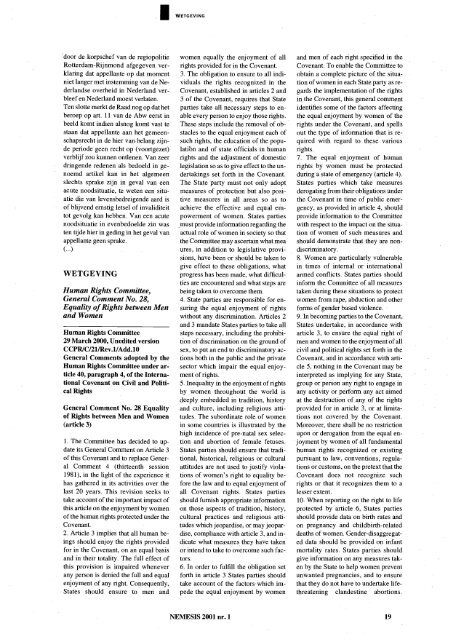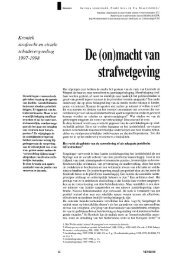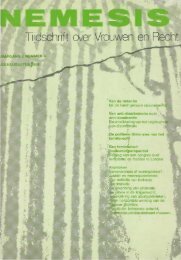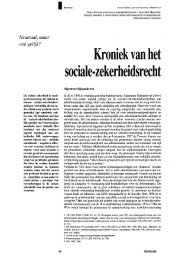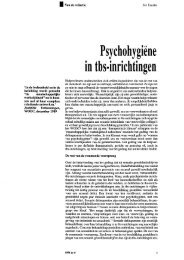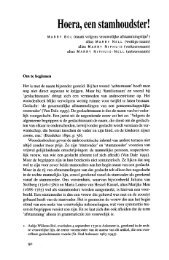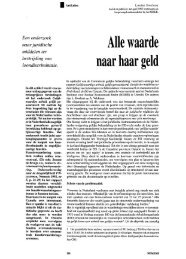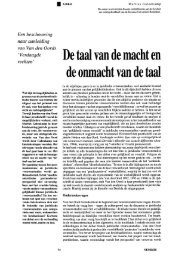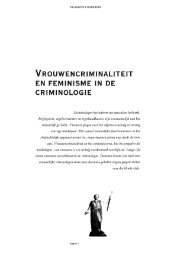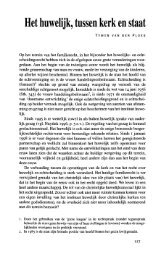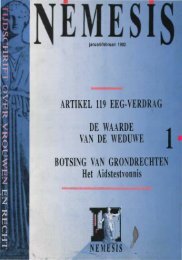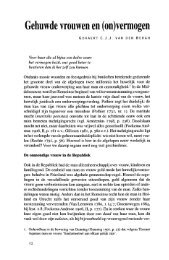(2001) nummer 1 januari/februari - Nemesis
(2001) nummer 1 januari/februari - Nemesis
(2001) nummer 1 januari/februari - Nemesis
You also want an ePaper? Increase the reach of your titles
YUMPU automatically turns print PDFs into web optimized ePapers that Google loves.
door de korpschef van de regiopolitie<br />
Rotterdam-Rijnmond afgegeven verklaring<br />
dat appellante op dat moment<br />
niet langer met instemming van de Nederlandse<br />
overheid in Nederland verbleef<br />
en Nederland moest verlaten.<br />
Ten slotte merkt de Raad nog op dat het<br />
beroep op art. 11 van de Abw eerst in<br />
beeld komt indien alsnog komt vast te<br />
staan dat appellante aan het gemeenschapsrecht<br />
in de hier van belang zijnde<br />
periode geen recht op (voortgezet)<br />
verblijf zou kunnen ontlenen. Van zeer<br />
dringende redenen als bedoeld in genoemd<br />
artikel kan in het algemeen<br />
slechts sprake zijn in geval van een<br />
acute noodsituatie, te weten een situatie<br />
die van levensbedreigende aard is<br />
of blijvend ernstig letsel of invaliditeit<br />
tot gevolg kan hebben. Van een acute<br />
noodsituatie in evenbedoelde zin was<br />
ten tijde hier in geding in het geval van<br />
appellante geen sprake.<br />
(...)<br />
WETGEVING<br />
Human Rights Committee,<br />
General Comment No. 28,<br />
Equality of Rights between Men<br />
and Women<br />
Human Rights Committee<br />
29 March 2000, Unedited version<br />
CCPR/C/21/Rev.l/Add.lO<br />
General Comments adopted by the<br />
Human Rights Committee under article<br />
40, paragraph 4, of the International<br />
Covenant on Civil and Political<br />
Rights<br />
General Comment No. 28 Equality<br />
of Rights between Men and Women<br />
(article 3)<br />
1. The Committee has decided to update<br />
its General Comment on Article 3<br />
of this Covenant and to replace General<br />
Comment 4 (thirteenth session<br />
1981), in the light of the experience it<br />
has gathered in its activities over the<br />
last 20 years. This revision seeks to<br />
take account of the important impact of<br />
this article on the enjoyment by women<br />
of the human rights protected under the<br />
Covenant.<br />
2. Article 3 implies that all human beings<br />
should enjoy the rights provided<br />
for in the Covenant, on an equal basis<br />
and in their totality. The full effect of<br />
this provision is impaired whenever<br />
any person is denied the full and equal<br />
enjoyment of any right. Consequently,<br />
States should ensure to men and<br />
WETGEVING<br />
women equally the enjoyment of all<br />
rights provided for in the Covenant.<br />
3. The obligation to ensure to all individuals<br />
the rights recognized in the<br />
Covenant, established in articles 2 and<br />
3 of the Covenant, requires that State<br />
parties take all necessary steps to enable<br />
every person to enjoy those rights.<br />
These steps include the removal of obstacles<br />
to the equal enjoyment each of<br />
such rights, the education of the populatibn<br />
and of state officials in human<br />
rights and the adjustment of domestic<br />
legislation so as to give effect to the undertakings<br />
set forth in the Covenant.<br />
The State party must not only adopt<br />
measures of protection but also positive<br />
measures in all areas so as to<br />
achieve the effective and equal empowerment<br />
of women. States parties<br />
must provide information regarding the<br />
actual role of women in society so that<br />
the Committee may ascertain what mea<br />
ures, in addition to legislative provisions,<br />
have been or should be taken to<br />
give effect to these obligations, what<br />
progress has been made, what difficulties<br />
are encountered and what steps are<br />
being taken to overcome them.<br />
4. State parties are responsible for ensuring<br />
the equal enjoyment of rights<br />
without any discrimination. Articles 2<br />
and 3 mandate States parties to take all<br />
steps necessary, including the prohibition<br />
of discrimination on the ground of<br />
sex, to put an end to discriminatory actions<br />
both in the public and the private<br />
sector which impair the equal enjoyment<br />
of rights.<br />
5. Inequality in the enjoyment of rights<br />
by women throughout the world is<br />
deeply embedded in tradition, history<br />
and culture, including religious attitudes.<br />
The subordinate role of women<br />
in some countries is illustrated by the<br />
high incidence of pre-natal sex selection<br />
and abortion of female fetuses.<br />
States parties should ensure that traditional,<br />
historical, religious or cultural<br />
attitudes are not used to justify violations<br />
of women's right to equality before<br />
the law and to equal enjoyment of<br />
all Covenant rights. States parties<br />
should furnish appropriate information<br />
on those aspects of tradition, history,<br />
cultural practices and religious attitudes<br />
which jeopardise, or may jeopardise,<br />
compliance with article 3, and indicate<br />
what measures they have taken<br />
or intend to take to overcome such factors.<br />
6. In order to fulfill the obligation set<br />
forth in article 3 States parties should<br />
take account of the factors which impede<br />
the equal enjoyment by women<br />
and men of each right specified in the<br />
Covenant. To enable the Committee to<br />
obtain a complete picture of the situation<br />
of women in each State party as regards<br />
the implementation of the rights<br />
in the Covenant, this general comment<br />
identifies some of the factors affecting<br />
the equal enjoyment by women of the<br />
rights under the Covenant, and spells<br />
out the type of information that is required<br />
with regard to these various<br />
rights.<br />
7. The equal enjoyment of human<br />
rights by women must be protected<br />
during a state of emergency (article 4).<br />
States parties which take measures<br />
derogating from their obligations under<br />
the Covenant in time of public emergency,<br />
as provided in article 4, should<br />
provide information to the Committee<br />
with respect to the impact on the situation<br />
of women of such measures and<br />
should demonstrate that they are nondiscriminatory.<br />
8. Women are particularly vulnerable<br />
in times of internal or international<br />
armed conflicts. States parties should<br />
inform the Committee of all measures<br />
taken during these situations to protect<br />
women from rape, abduction and other<br />
forms of gender based violence.<br />
9. In becoming parties to the Covenant,<br />
States undertake, in accordance with<br />
article 3, to ensure the equal right of<br />
men and women to the enjoyment of all<br />
civil and political rights set forth in the<br />
Covenant, and in accordance with article<br />
5, nothing in the Covenant may be<br />
interpreted as implying for any State,<br />
group or person any right to engage in<br />
any activity or perform any act aimed<br />
at the destruction of any of the rights<br />
provided for in article 3, or at limitations<br />
not covered by the Covenant.<br />
Moreover, there shall be no restriction<br />
upon or derogation from the equal enjoyment<br />
by women of all fundamental<br />
human rights recognized or existing<br />
pursuant to law, conventions, regulations<br />
or customs, on the pretext that the<br />
Covenant does not recognize such<br />
rights or that it recognizes them to a<br />
lesser extent.<br />
10. When reporting on the right to life<br />
protected by article 6, States parties<br />
should provide data on birth rates and<br />
on pregnancy and childbirth-related<br />
deaths of women. Gender-disaggregated<br />
data should be provided on infant<br />
mortality rates. States parties should<br />
give information on any measures taken<br />
by the State to help women prevent<br />
unwanted pregnancies, and to ensure<br />
that they do not have to undertake lifethreatening<br />
clandestine abortions.<br />
NEMESIS <strong>2001</strong> nr. 1 19


